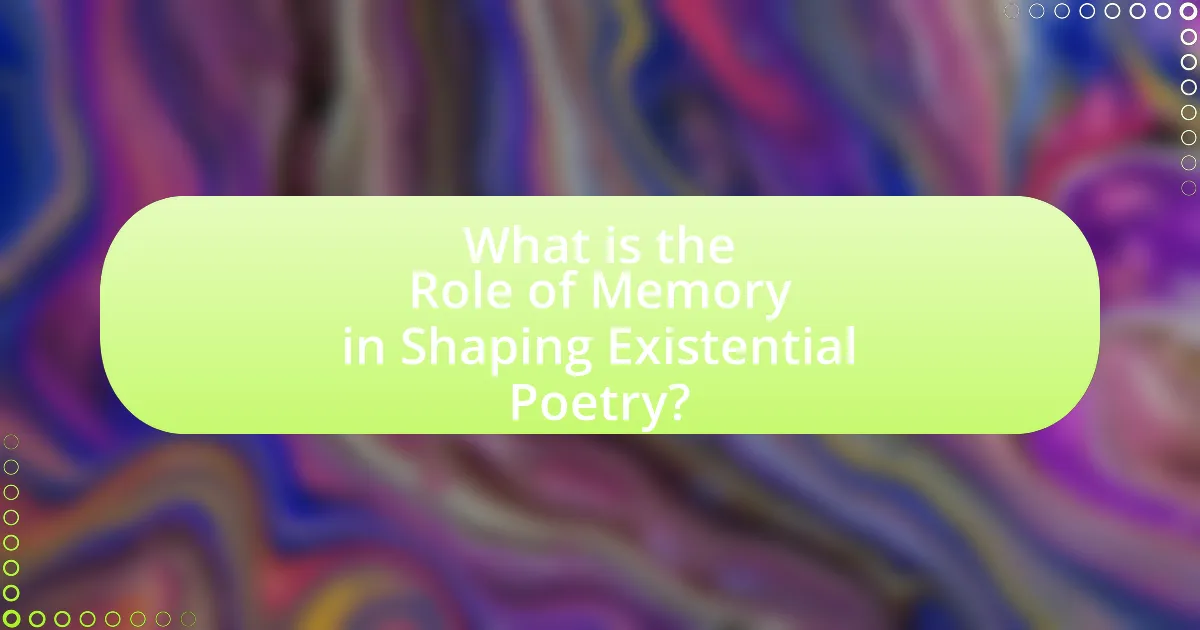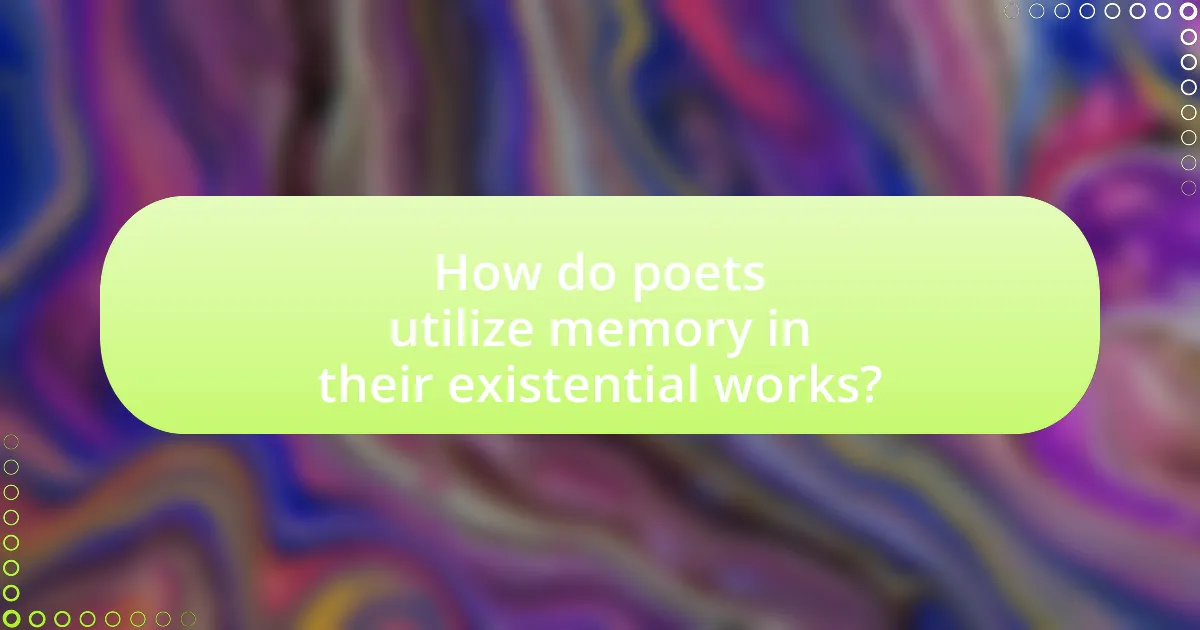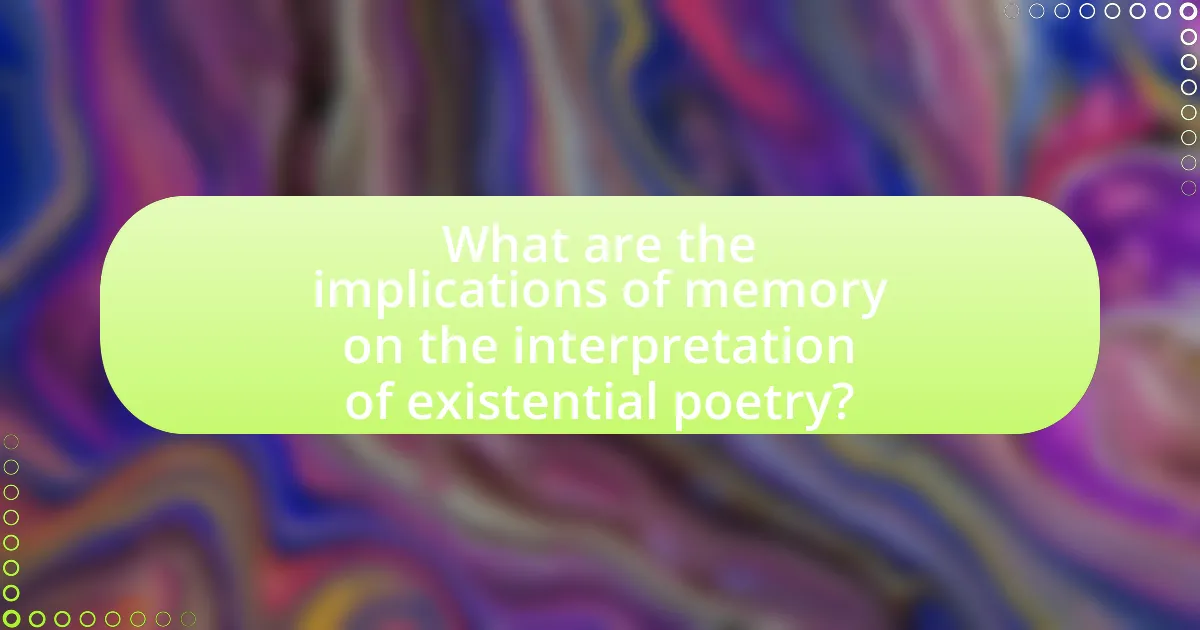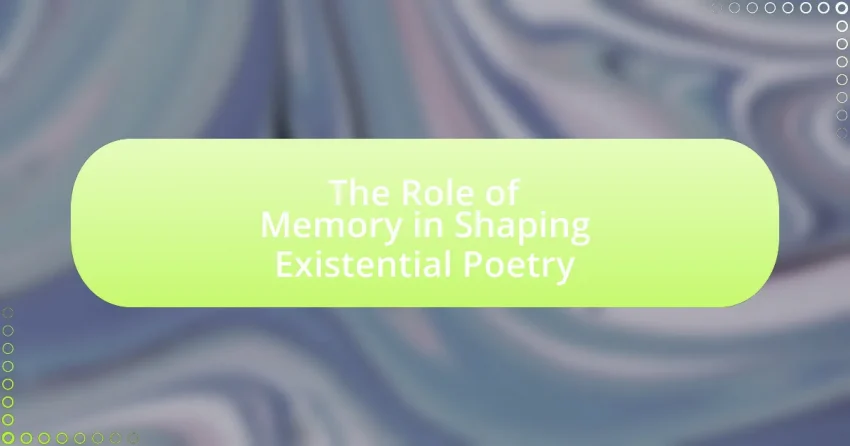The article examines the pivotal role of memory in shaping existential poetry, highlighting how poets utilize personal recollections to explore themes of identity, existence, and the human condition. It discusses the influence of memory on existential themes, including nostalgia, loss, and the passage of time, as illustrated in the works of notable poets such as T.S. Eliot and Sylvia Plath. The article also delves into the techniques poets employ to evoke memory, the emotional landscape created by these memories, and the implications for readers’ interpretations of existential poetry. Through this analysis, the connection between memory and existential thought is emphasized, showcasing how memories inform both the poet’s expression and the reader’s engagement with the text.

What is the Role of Memory in Shaping Existential Poetry?
Memory plays a crucial role in shaping existential poetry by serving as a lens through which poets explore themes of identity, existence, and the human condition. Existential poets often draw upon personal memories to reflect on the transient nature of life and the search for meaning, as seen in the works of poets like T.S. Eliot and Sylvia Plath. For instance, Eliot’s “The Waste Land” utilizes fragmented memories to convey a sense of dislocation and despair, illustrating how recollections can evoke profound existential questions. This connection between memory and existential thought highlights the interplay between past experiences and the quest for understanding one’s place in the world, reinforcing the idea that memory is not merely a recollection but a vital component in the construction of existential narratives.
How does memory influence the themes in existential poetry?
Memory significantly influences the themes in existential poetry by serving as a lens through which individuals confront their existence and the passage of time. In existential poetry, memory often evokes feelings of nostalgia, regret, and the search for meaning, highlighting the tension between past experiences and present realities. For instance, poets like T.S. Eliot in “The Love Song of J. Alfred Prufrock” utilize memory to explore the protagonist’s internal struggles and existential dilemmas, illustrating how recollections shape one’s identity and perceptions of life. This interplay between memory and existential themes underscores the complexity of human experience, emphasizing how past events inform present choices and future uncertainties.
What specific memories are often explored in existential poetry?
Existential poetry often explores memories related to personal loss, the passage of time, and moments of profound self-reflection. These memories serve as a backdrop for themes of alienation, mortality, and the search for meaning in an indifferent universe. For instance, poets like T.S. Eliot in “The Love Song of J. Alfred Prufrock” reflect on the fleeting nature of time and the regrets associated with unfulfilled desires, illustrating how such memories shape one’s existential crisis. Additionally, the recollection of past relationships and their emotional weight is a common motif, as seen in the works of Rainer Maria Rilke, who delves into the impact of love and separation on the human psyche. These specific memories are crucial in existential poetry as they highlight the tension between individual experience and the broader existential questions of existence.
How do poets use memory to convey existential angst?
Poets use memory to convey existential angst by reflecting on past experiences that evoke feelings of loss, regret, and uncertainty about existence. This technique allows poets to explore the tension between the idealized past and the often harsh realities of the present, creating a sense of disconnection and anxiety. For instance, in T.S. Eliot’s “The Love Song of J. Alfred Prufrock,” the speaker’s memories of missed opportunities and social anxieties illustrate his profound existential crisis. Such memories serve as a lens through which poets examine the fragility of identity and the inevitability of time, reinforcing the theme of existential angst.
Why is memory considered a crucial element in existential poetry?
Memory is considered a crucial element in existential poetry because it serves as a lens through which individuals confront their existence and the passage of time. In existential poetry, memory evokes feelings of nostalgia, loss, and the search for meaning, allowing poets to explore the complexities of human experience. For instance, poets like T.S. Eliot and W.H. Auden utilize memory to reflect on personal and collective histories, illustrating how past experiences shape present identities and existential dilemmas. This connection between memory and identity is essential in existential thought, as it emphasizes the subjective nature of reality and the individual’s struggle to find purpose amidst the chaos of existence.
What philosophical perspectives link memory and existence?
Philosophical perspectives that link memory and existence include existentialism and phenomenology. Existentialism posits that individual experience and memory shape one’s essence and identity, as articulated by philosophers like Jean-Paul Sartre, who emphasized that existence precedes essence, meaning that memories contribute to the formation of self. Phenomenology, particularly through the work of Edmund Husserl, asserts that consciousness and memory are integral to experiencing existence, as they allow individuals to interpret and make sense of their lived experiences. These perspectives highlight that memory is not merely a recollection of past events but a fundamental component of how individuals understand their existence and identity in the world.
How does memory contribute to the understanding of self in poetry?
Memory significantly contributes to the understanding of self in poetry by serving as a repository of personal experiences and emotions that shape identity. Poets often draw upon memories to explore their past, allowing them to reflect on their growth, relationships, and existential questions. For instance, in the works of poets like T.S. Eliot and Sylvia Plath, memory acts as a lens through which they examine their inner lives and societal contexts, revealing how past events influence their current selves. This interplay between memory and self-awareness is crucial, as it enables poets to articulate complex feelings and insights, ultimately enriching the reader’s understanding of the human condition.

How do poets utilize memory in their existential works?
Poets utilize memory in their existential works to explore themes of identity, loss, and the passage of time. By invoking personal and collective memories, poets create a reflective space that allows readers to confront the complexities of existence. For instance, in T.S. Eliot’s “The Waste Land,” the fragmented memories of the past serve to highlight the disconnection and despair of modern life, illustrating how memory shapes one’s understanding of self and reality. This technique emphasizes the interplay between memory and existential thought, revealing how recollections can influence present perceptions and future possibilities.
What techniques do poets employ to evoke memory?
Poets employ techniques such as imagery, symbolism, and personal narrative to evoke memory. Imagery allows poets to create vivid mental pictures that trigger recollections, while symbolism connects abstract concepts to specific memories, enhancing emotional resonance. Personal narrative, often drawn from the poet’s own experiences, invites readers to engage with the memories being shared, fostering a sense of familiarity and connection. These techniques are effective because they tap into the universal human experience of memory, making the emotions and themes more relatable and impactful.
How does imagery play a role in recalling memories?
Imagery significantly enhances the recall of memories by creating vivid mental representations that engage multiple sensory modalities. When individuals visualize specific images associated with past experiences, these representations activate neural pathways linked to those memories, facilitating retrieval. Research indicates that imagery can improve memory recall by up to 50%, as demonstrated in studies where participants who used imagery techniques remembered more information than those who did not. This phenomenon underscores the importance of imagery in memory processes, particularly in contexts like existential poetry, where evocative imagery can evoke personal reflections and deeper emotional connections to past experiences.
What narrative structures are used to present memories in poetry?
Narrative structures used to present memories in poetry include linear progression, fragmented narratives, and cyclical structures. Linear progression allows poets to recount memories in a chronological order, creating a clear timeline of events, as seen in works like “The Prelude” by William Wordsworth. Fragmented narratives present memories in disjointed pieces, reflecting the chaotic nature of recollection, which can be observed in the poetry of T.S. Eliot. Cyclical structures often revisit themes or images, emphasizing the repetitive nature of memory, as illustrated in the works of Sylvia Plath. These structures effectively convey the complexities of memory and its impact on identity and existence.
In what ways does memory shape the emotional landscape of existential poetry?
Memory profoundly shapes the emotional landscape of existential poetry by serving as a conduit for personal reflection and existential inquiry. Through the recollection of past experiences, poets explore themes of identity, loss, and the passage of time, which are central to existential thought. For instance, the works of poets like T.S. Eliot and W.H. Auden illustrate how memories evoke feelings of nostalgia and despair, prompting readers to confront their own existential dilemmas. The act of remembering becomes a means to grapple with the absurdity of existence, as seen in Eliot’s “The Love Song of J. Alfred Prufrock,” where fragmented memories reflect the speaker’s inner turmoil and alienation. Thus, memory not only enriches the emotional depth of existential poetry but also invites a deeper understanding of the human condition.
How do memories create a sense of nostalgia or loss in poetry?
Memories create a sense of nostalgia or loss in poetry by evoking emotional connections to past experiences, often highlighting the contrast between what was and what is. Poets utilize vivid imagery and sensory details to transport readers to specific moments, allowing them to relive emotions associated with those memories. For instance, in works like “The Waste Land” by T.S. Eliot, the recollection of lost love and the passage of time generates a profound sense of longing and melancholy. This technique is supported by psychological studies indicating that nostalgia can enhance emotional well-being, as it often involves reflecting on cherished moments, thus reinforcing the emotional weight of loss in poetic expression.
What impact does memory have on the reader’s emotional response?
Memory significantly influences the reader’s emotional response by evoking personal associations and feelings tied to past experiences. When readers encounter themes of memory in existential poetry, they often reflect on their own memories, which can amplify emotions such as nostalgia, sadness, or joy. Research indicates that memory retrieval activates the same neural pathways associated with the original experience, enhancing emotional engagement. For instance, studies in cognitive psychology show that recalling a personal memory can elicit similar emotional states as when the event originally occurred, thereby deepening the reader’s connection to the poem’s themes.

What are the implications of memory on the interpretation of existential poetry?
Memory significantly influences the interpretation of existential poetry by shaping the emotional and cognitive responses of readers. This influence manifests through the recollection of personal experiences and historical contexts that resonate with the themes of existence, identity, and the human condition often explored in such poetry. For instance, poets like T.S. Eliot and Sylvia Plath utilize memory to evoke feelings of alienation and introspection, allowing readers to connect their own memories to the existential dilemmas presented in the text. This connection enhances the depth of interpretation, as readers draw parallels between their lived experiences and the existential questions posed by the poetry. Thus, memory acts as a lens through which existential poetry is understood, enriching the reader’s engagement and interpretation of the work.
How does the reader’s own memory influence their understanding of a poem?
The reader’s own memory significantly influences their understanding of a poem by providing personal context and emotional resonance. When readers engage with a poem, they draw upon their past experiences, emotions, and associations, which shape their interpretation and connection to the text. For instance, a poem that evokes themes of loss may resonate differently for someone who has experienced grief compared to someone who has not, leading to varied interpretations. Research in cognitive psychology indicates that memory plays a crucial role in how individuals process and relate to literary texts, as personal memories can activate specific emotional responses and cognitive frameworks that guide understanding. This interplay between memory and interpretation underscores the subjective nature of poetry, where each reader’s unique experiences contribute to a diverse range of meanings.
What role does personal experience play in interpreting memory in poetry?
Personal experience significantly influences the interpretation of memory in poetry by providing a subjective lens through which readers and poets engage with the text. This subjective lens allows individuals to connect their own memories and emotions to the themes presented in the poetry, enhancing the depth of understanding and resonance. For instance, poets often draw from their own life experiences, which imbue their work with authenticity and emotional weight, making it relatable to readers who may have faced similar situations. Research indicates that personal memories can evoke strong emotional responses, which in turn shape how poetry is perceived and interpreted, as seen in the works of poets like Sylvia Plath and Pablo Neruda, who often reflect their personal histories and emotions in their poetry.
How can different cultural memories affect the reading of existential poetry?
Different cultural memories significantly influence the reading of existential poetry by shaping the interpretations and emotional responses of readers. Cultural memories, which encompass shared experiences, historical events, and collective narratives, provide a framework through which individuals understand existential themes such as identity, mortality, and the search for meaning. For instance, a reader from a culture that has experienced war may interpret existential poetry’s themes of despair and alienation through the lens of trauma, while a reader from a culture emphasizing community and connection may focus on themes of belonging and hope. This variance in interpretation is supported by research indicating that cultural context plays a crucial role in literary analysis, as highlighted in studies like “Cultural Memory and the Politics of Identity” by Jan Assmann, which illustrates how collective memory shapes individual perception and meaning-making in literature.
What are some notable examples of existential poetry that highlight memory?
Notable examples of existential poetry that highlight memory include “The Waste Land” by T.S. Eliot, “Do Not Go Gentle into That Good Night” by Dylan Thomas, and “The Love Song of J. Alfred Prufrock,” also by T.S. Eliot. In “The Waste Land,” Eliot explores fragmented memories and the disillusionment of post-war society, reflecting on the past’s impact on the present. Dylan Thomas’s poem emphasizes the struggle against death and the memories of life that shape one’s identity. Similarly, “The Love Song of J. Alfred Prufrock” delves into the protagonist’s memories and insecurities, illustrating how recollections influence existential contemplation. These works exemplify how memory serves as a crucial element in understanding existential themes in poetry.
Which poets are renowned for their exploration of memory in existential themes?
Renowned poets for their exploration of memory in existential themes include T.S. Eliot, W.B. Yeats, and Paul Celan. T.S. Eliot’s “The Waste Land” delves into fragmented memories reflecting the disillusionment of modern existence. W.B. Yeats often revisits personal and collective memories in his works, such as “The Tower,” to confront themes of identity and mortality. Paul Celan’s poetry, particularly in “Death Fugue,” intertwines memory with the trauma of the Holocaust, emphasizing the existential weight of remembrance. These poets effectively illustrate how memory shapes human experience and existential contemplation.
What specific poems exemplify the connection between memory and existential thought?
Specific poems that exemplify the connection between memory and existential thought include “The Waste Land” by T.S. Eliot and “Do Not Go Gentle into That Good Night” by Dylan Thomas. “The Waste Land” explores fragmented memories and the search for meaning in a chaotic world, reflecting existential themes of despair and renewal. Eliot’s use of allusions and personal recollections illustrates how memory shapes identity and existence. Similarly, “Do Not Go Gentle into That Good Night” confronts the inevitability of death, urging a struggle against it, which ties memory to the human experience of mortality and the desire for legacy. Both poems highlight how memory influences existential contemplation and the quest for significance in life.
How can readers engage with memory in existential poetry?
Readers can engage with memory in existential poetry by reflecting on personal experiences that resonate with the themes presented in the poems. This engagement allows readers to connect their own memories to the existential questions posed by the poetry, such as the nature of existence, identity, and the passage of time. For instance, poets like T.S. Eliot and Sylvia Plath often incorporate memory as a means to explore the human condition, prompting readers to recall their own pasts and consider how those memories shape their understanding of life. This interaction not only deepens the emotional impact of the poetry but also fosters a dialogue between the reader’s lived experiences and the existential themes explored in the work.
What practices can enhance the appreciation of memory in poetry?
Practices that can enhance the appreciation of memory in poetry include engaging in active reading, writing personal reflections, and exploring historical contexts. Active reading encourages readers to annotate and connect emotionally with the text, fostering a deeper understanding of how memory shapes the poem’s themes. Writing personal reflections allows individuals to relate their own memories to the poem, creating a personal connection that enhances appreciation. Additionally, exploring historical contexts provides insight into the poet’s experiences and influences, enriching the reader’s comprehension of the role memory plays in the work. These practices collectively deepen the engagement with poetry and highlight the significance of memory in existential themes.
How can readers reflect on their own memories while reading existential poetry?
Readers can reflect on their own memories while reading existential poetry by engaging with the themes of identity, existence, and the human condition presented in the poems. Existential poetry often explores profound questions about life, death, and personal experience, prompting readers to connect their own life events and emotions to the text. For instance, when a poem discusses feelings of isolation or despair, readers may recall similar moments in their own lives, allowing for a deeper emotional resonance and personal insight. This reflective process is supported by psychological studies indicating that literature can evoke autobiographical memories, enhancing the reader’s connection to the material. Thus, existential poetry serves as a catalyst for introspection, enabling readers to examine their own memories and experiences in relation to the existential themes presented.
